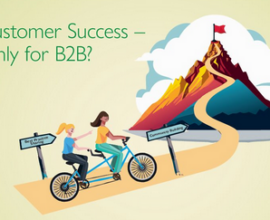Support – the game changer in the digital world
Support is so important? Really?
Of course your product needs to meet the need of your clients. Of course the quality of your product, value proposition, the marketing concept etc need to fulfill what your clients desire and I hope you have done your research to be in line with the market need. There is an unobtrusive process, that appears to lead a wallflower existence in many companies. It is not generating direct revenue, it potentially even reminds a company of the “problems” it faces, a business area that is not very attractive compared to marketing or sales. This process tends to be forgotten, or not listed right in the front in terms of importance of operational processes as it does not generate direct value that can be immediately seen in revenue figures. Yet – for me – having support properly setup could decide about a company´s success or failure. It is THE game changer. Yes we agree ideally there is no support need at all and that should be the direction but until then, it is a vital experience driver in the customer journey.
Why support?
Support was always important. In the digital times of today, clients – existing or potential new clients – take over a lot of research and information gathering themselves – tasks that have been fulfilled by sales people in the past. A company can lose clients before even knowing about their existence. In the digital age clients are self-serving the information needed to take a buying decision – only at a very late stage of the sales funnel a client might need to get in contact with a company´s sales personnel – sometimes not even this contact is taking place when an offer is truly digital and meant to be fulfilled on a digital marketplace. In this business landscape companies need to make sure that clients are able to find what they need and when they need it in their sales journey to take a buying decision. It is vital that clients easily finding resolutions for problems they are facing or questions they want to ask, eg in the pre-sales-funnel of online trials.
Even when you have the clearest, optimized online presence you can think of, there will be cases where a client needs or wants to get in contact with a company. How does your company handle these requests? How easy it is to get in touch with your company? How simple is it to reach the skilled person within your company who can help you? How much do your employees feel responsible and take ownership of support questions?
These questions and more are very likely generated through one of the most important touchpoints in a client journey. This touchpoint and your company´s ability to handle a great client experience sends a message to your client. A message on the importance of the questions a client has, on the willingness to help and support the client, on easy accessability, on personalization, on “humanizing” a company that you potentially only know from a digital presence. It provides the human factor that is important for clients and yet so reduced in the digital world which increases the value and importance of handling the client experience on this touchpoint exceptionally professional.
When you think of your latest experience as a client – take on the outside in view of your clients – what is it that made you happy or unsatisfied, what would have been needed to make you happy?
It depends on your company´s s ability to show accountability, to build trust and here it needs each and every employee who is in contact with the client – be it on live chat, mail or phone. It needs accountability, reliability, speed and personalization to reassure the clients that despite the fact that the journey happens digitally – there is always someone to reach in a company, someone who walks the extra mile for you, someone who helps you and does not leave you alone and unassisted with whatever question, issue or concern you have. Testing products very often means that also the support structure is tested alongside with the actual product – and a client would decide for the company with the better support structure when there are similar products from two different companies.
Let´s summarize the main points to consider:
Key take-aways:
- Support is an integral part of the buying journey – it has the power to deepen or kill a business relationship
- Creating the best client experience when it comes to support can give you a competitive advantage
- Creating a great support experience requires ownership & accountability and the understanding that each employee is representing the face of your company vis-a-vis your client – this needs to be part of your company culture.
- Making it easy, relevant, timely and satisfying to contact your company will ease the path for loyal, delighted clients.





